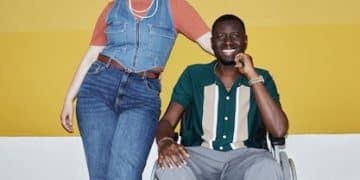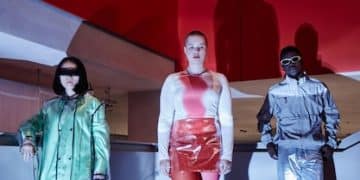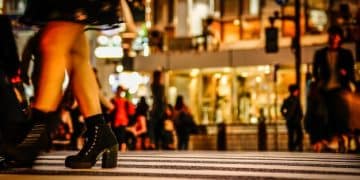US Fashion Consumer Behavior: Trends & Purchases at Fashion Events
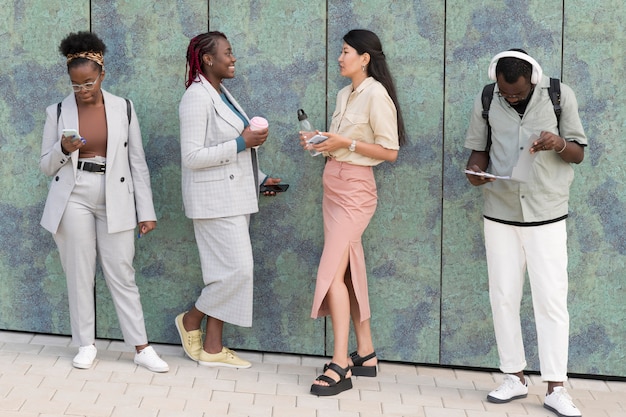
Advertisements
US fashion consumer behavior at fashion events reveals a preference for unique, experience-driven purchases, with attendees often investing in statement pieces, exclusive collaborations, and personalized fashion items that reflect their individual style and the event’s atmosphere.
Understanding US fashion consumer behavior: what are shoppers buying at fashion events? is crucial for designers, marketers, and retailers. These events serve as barometers of emerging trends and reveal the evolving preferences that drive consumers in the US fashion landscape.
Advertisements
Decoding US Fashion Consumer Behavior at Events
Fashion events in the US are more than just runway shows; they are cultural moments that significantly influence consumer behavior. By understanding what shoppers are buying at these events, businesses can tailor their strategies to meet evolving demands.
These events offer a unique glimpse into the intersection of trendsetting and immediate consumer response, making them invaluable for those in the fashion industry.
Advertisements
The Allure of Exclusivity
One of the key drivers of consumer behavior at fashion events is the allure of exclusivity. Limited-edition items and collaborations create a sense of urgency and desire among attendees.
Consumers are drawn to products that offer a unique experience and a story to tell. This exclusivity fuels purchasing decisions and enhances the overall event experience.
- Limited-edition Collections: Shoppers seek out exclusive capsule collections launched specifically at events.
- Designer Collaborations: Unique partnerships between designers and brands drive interest and sales.
- Personalized Items: Customization options allow consumers to create one-of-a-kind pieces.
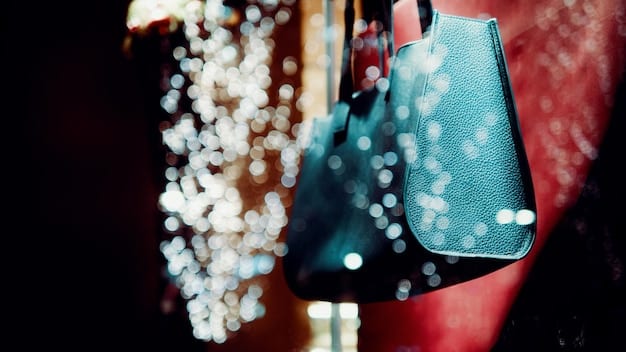
The desire to own something unique and rare motivates consumers to make purchases that go beyond mere functionality. These items become symbols of their connection to the event and the fashion world.
Exclusivity plays a pivotal role in influencing consumer choices at fashion events, driving demand for rare and unique products that offer a distinct story and connection.
The Impact of Influencers on Consumer Purchases
Influencers wield significant power in shaping consumer behavior, particularly at fashion events. Their curated content and endorsements can drive attendees to purchase specific items or adopt emerging trends.
Businesses leverage influencer marketing to amplify their reach and connect with key consumer demographics, making influencers an integral part of the fashion event ecosystem.
Authenticity and Trust
Consumers are increasingly valuing authenticity and trust when it comes to influencer endorsements. They seek influencers who align with their values and offer genuine recommendations.
This trust translates into purchasing decisions, as consumers are more likely to buy products endorsed by influencers they respect and admire.
- Brand Partnerships: Influencers collaborate with brands to showcase and promote products at events.
- Social Media Engagement: Real-time updates, reviews, and photos shared by influencers generate buzz and drive sales.
- Personal Style: Influencers’ unique fashion sense inspires followers to experiment with new styles and trends.
The influence of social media has transformed how consumers discover and engage with fashion brands. Influencers serve as a bridge between brands and their target audiences.
Influencers play a critical role in shaping purchase decisions, leveraging their authenticity and engagement to guide consumers towards specific brands and products at fashion events.
Experiential Shopping: Beyond the Product
Experiential shopping is transforming the retail landscape, particularly at fashion events. Consumers are seeking out immersive experiences that go beyond simply buying a product.
Brands are creating interactive displays, personalized consultations, and engaging activities to enhance the shopping journey and foster deeper connections with their customers.
Creating Memorable Moments
Memorable moments are key to driving experiential shopping. Brands aim to create unique and shareable experiences that resonate with consumers long after the event has ended.
These moments often involve sensory experiences, interactive elements, and personalized interactions that elevate the shopping experience.
- Interactive Displays: Engaging visuals and interactive installations draw consumers into the brand’s world.
- Personalized Consultations: Expert advice and styling sessions enhance the shopping experience.
- Pop-Up Shops: Exclusive retail spaces offer unique products and immersive brand experiences.
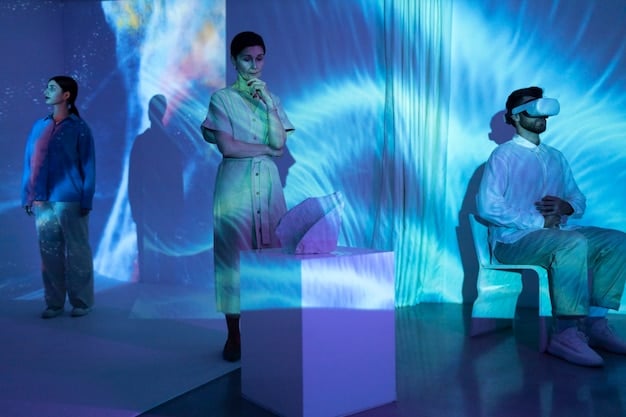
Experiential shopping is about creating memories and building emotional connections with consumers. These experiences drive loyalty and advocacy, fostering a stronger brand presence.
The focus on creating memorable moments is driving the evolution of retail, with experiential shopping becoming a central component of consumer behavior at fashion events and beyond.
The Role of Sustainability in Fashion Choices
Sustainability is increasingly influencing consumer choices in the fashion industry. Shoppers are becoming more aware of the environmental and social impact of their purchases.
Brands that prioritize sustainable practices, ethical sourcing, and eco-friendly materials are gaining favor among conscientious consumers seeking to make a positive impact.
Ethical Sourcing and Transparency
Ethical sourcing and transparency are crucial components of sustainability. Consumers want to know where their clothes come from and how they are made.
Brands that provide detailed information about their supply chain and labor practices are building trust and credibility with their customers.
- Eco-Friendly Materials: Sustainable fabrics and production methods reduce the environmental footprint of fashion.
- Ethical Labor Practices: Fair wages and safe working conditions ensure social responsibility.
- Transparency and Traceability: Detailed information about the supply chain builds consumer trust.
Sustainability is not just a trend; it’s a core value that is shaping the future of fashion. Consumers are seeking out brands that align with their values and demonstrate a commitment to environmental and social responsibility.
Sustainability plays an increasingly critical role in shaping consumer behavior, with ethical sourcing and transparency becoming essential factors in purchasing decisions at fashion events and beyond.
Digital Integration and Consumer Engagement
Digital integration is transforming the way consumers engage with fashion events. From live streaming runway shows to interactive digital displays, technology is enhancing the event experience.
Brands are leveraging digital platforms to connect with consumers in real-time, gather feedback, and drive online sales, extending the reach and impact of fashion events.
Leveraging Technology
Technology is playing a key role in enhancing engagement. Brands that are innovative are using AI, AR and VR experiences to captivate consumers during fashion events.
These technologies can be used in immersive experiences, interactive elements, and personalized interactions that elevate the shopping experience and engage participants.
- AI-Powered Fitting Rooms: Allow consumers to try on their clothes virtually and eliminate the need for physical interactions.
- AR Shopping: Shoppers can explore the latest collections in AR format directly within their homes.
- VR Experiences: Attendees can immerse themselves in a futuristic fashion experience.
Digital is no longer just a nice to have but a need to have. Consumers rely on the ability to access all that they need right from their mobile device.
Digital integration is a must and engagement leverages innovative opportunities to engage their consumers in ways never done before.
The Influence of Cultural Moments on Fashion Trends
Cultural moments, such as award shows, music festivals, and historical events, have a profound influence on fashion trends. These moments often spark new styles and inspire consumers to adopt them.
Brands and designers draw inspiration from these cultural touchstones, creating collections that reflect the zeitgeist and resonate with consumers on a deeper level.
Reflecting the Zeitgeist
Fashion often serves as a mirror reflecting the cultural and social currents of the time. Events that capture the public’s imagination often translate into fashion trends.
Designers draw inspiration from art, music, and social movements, creating collections that resonate with the spirit of the age.
- Award Show Styles: Red carpet looks often set the tone for upcoming fashion trends.
- Music Festival Fashion: Bohemian and eclectic styles gain popularity from music festivals.
- Historical Influences: Vintage styles and historical references inspire contemporary designs.
Cultural moments infuse fashion with meaning and relevance, making it more than just clothing but a form of self-expression and cultural commentary. Fashion builds trends over time so the influences that cause them are an important factor in what impacts it.
Cultural moments continue to shape fashion trends, reflecting the ever-evolving landscape of social, artistic, and historical influences that inspire consumer behavior and purchasing decisions.
| Key Point | Brief Description |
|---|---|
| 🛍️ Exclusivity | Limited-edition items create a sense of urgency. |
| 🌟 Influencers | Shape purchases through endorsements and style. |
| ✨ Experiences | Immersive shopping enhances brand connections. |
| 🌱 Sustainability | Ethical sourcing influences fashion choices. |
FAQ
▼
The main factors include the desire for exclusivity, the influence of social media influencers, the attraction of experiential shopping, and the growing emphasis on sustainability and ethical fashion.
▼
Influencers play a significant role by showcasing products, sharing real-time updates, and inspiring followers with their personal style, which often translates into direct sales.
▼
Experiential shopping creates memorable moments and emotional connections with consumers, enhancing brand loyalty through interactive displays, personalized consultations, and engaging activities.
▼
Consumers are increasingly seeking brands with sustainable practices, ethical sourcing, and eco-friendly materials, impacting their purchasing decisions at fashion events and beyond.
▼
Digital integration enhances consumer engagement through live streaming, interactive displays, and real-time feedback, extending the reach and impact of fashion events to online platforms.
Conclusion
In conclusion, understanding US fashion consumer behavior requires a multi-faceted approach that considers exclusivity, influencer impact, experiential shopping, sustainability, and digital integration. By catering to these factors, brands can effectively engage with consumers and drive sales at fashion events, staying ahead of evolving trends.

